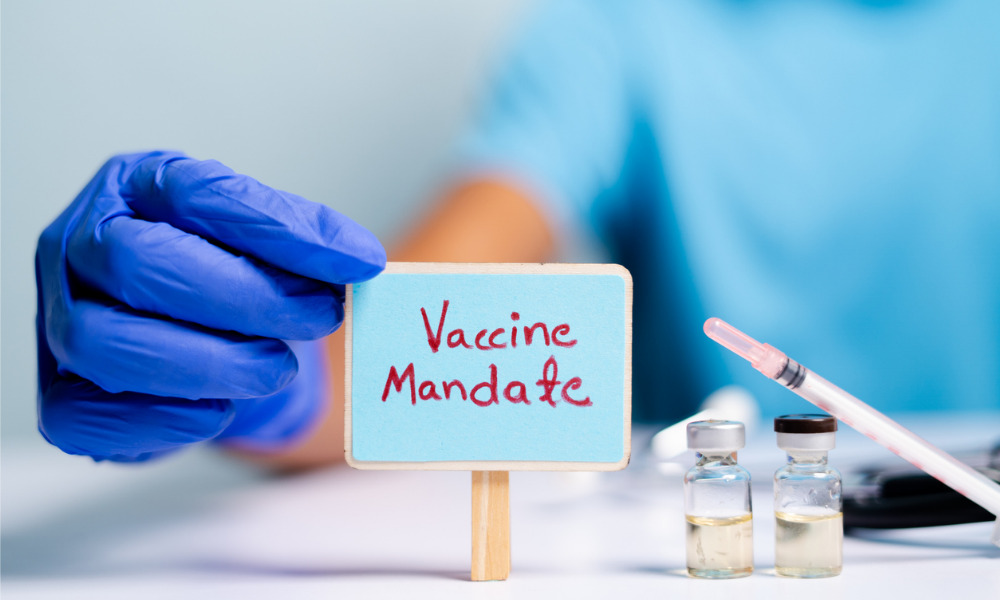
COVID-19 vaccine mandate in line with employer's health and safety obligations: arbitrator

An Ontario labour arbitrator has upheld an employer’s policy to make COVID-19 vaccination mandatory for all its employees.
In a recent arbitration award, the United Food and Commercial Workers Union, Canada Local 333, had been informed that Paragon Protection Ltd. had issued a notice regarding its policy on a COVID-19 vaccine mandate in September 2021. Paragon employs nearly 4,400 security guards who are assigned to almost 450 client sites in Ontario. The security guards are UFCW union members.
Pursuant to its mandatory vaccination policy, Paragon requires all its employees to be fully vaccinated by October 31, 2021. To protect the health and safety of the community while complying with human rights requirements, employees, with an approved medical or religious exemption from being vaccinated, may be accommodated. However, they may need to be placed at a different site where Paragon perform services, may be required to participate in further COVID-19 testing requirements, may be required to take an unpaid leave of absence or may be subject to further requirements. Any violator may be subject to disciplinary action, including termination for just cause.
Since majority of its clients have been adopting vaccination policies for their employees and contractors, it had no other option but to introduce the mandatory vaccination policy “as an operational necessity to properly service its clients,” Paragon said.
As its members raised health concerns about the mandatory vaccination policy, UFCW initiated a grievance against Paragon. UFCW alleged that the policy was unreasonable and unenforceable for the following reasons: First, Paragon violated the provisions of their collective agreement, particularly article 4 and article 24. Second, Paragon breached the Health Care Consent Act and the Ontario Human Rights Code. Third, the policy was inconsistent with the principles set out in KVP and St. Michael’s Hospital arbitration awards.
In its submissions, Paragon argued the following:
In his decision, Arbitrator F.R. von Veh dismissed UFCW’s grievance and held that Paragon’s mandatory vaccination policy was adopted in accordance with the parties’ collective agreement and deemed reasonable and enforceable.
von Veh found that the mandatory principles set out in article 24.05, in which “. . . an employee must agree to receive such vaccination or inoculation,” have been in force and effect since December 2015 and were correctly incorporated into Paragon’s mandatory vaccination policy.
von Veh also found that Paragon, in unilaterally introducing the mandatory vaccination policy, promulgated “reasonable rules and regulations to be observed by the employees” in line with the provision of article 4.01 (b) and KVP principles.
von Veh affirmed that the Paragon has the duty to protect the health and safety of its employees pursuant to the Occupational Health and Safety Act. He referred to s. 25(2)(h) which provides that an employer must take “every precaution reasonable in the circumstances for protection of its worker.” Paragon, in implementing the mandatory vaccination policy, had taken “every precaution reasonable” to satisfy that duty, he said.
von Veh determined that the mandatory vaccination policy was compliant with the Ontario Human Rights Code. He said that the policy strikes a balance to respect the unvaccinated employees’ rights, while respecting a safe workplace for its employees, clients and the public with whom the security guards interact.
The provisions of the Health Care Consent Act have no relevance to the matters being adjudicated in the arbitration proceedings, von Veh said.
von Veh agreed with the Paragon’s claim that the principles set out in St. Michael’s Hospital are inapplicable to the present case. The St. Michael’s Hospital award dealt with an annual influenza vaccine and the wearing of masks and not certainly with the current COVID-19 conditions, he said.
On the issue of rapid antigen testing, von Veh recommended that if an employee does not provide proof of vaccination but instead relies on an acceptable medical or religious reason, he or she must submit to a regular rapid antigen testing at his or her own time and expense and demonstrate a negative result. He also recommended that the testing must occur at a minimum once every seven calendar days and if an employee goes beyond seven calendar days between testing, he or she would not be permitted to work.